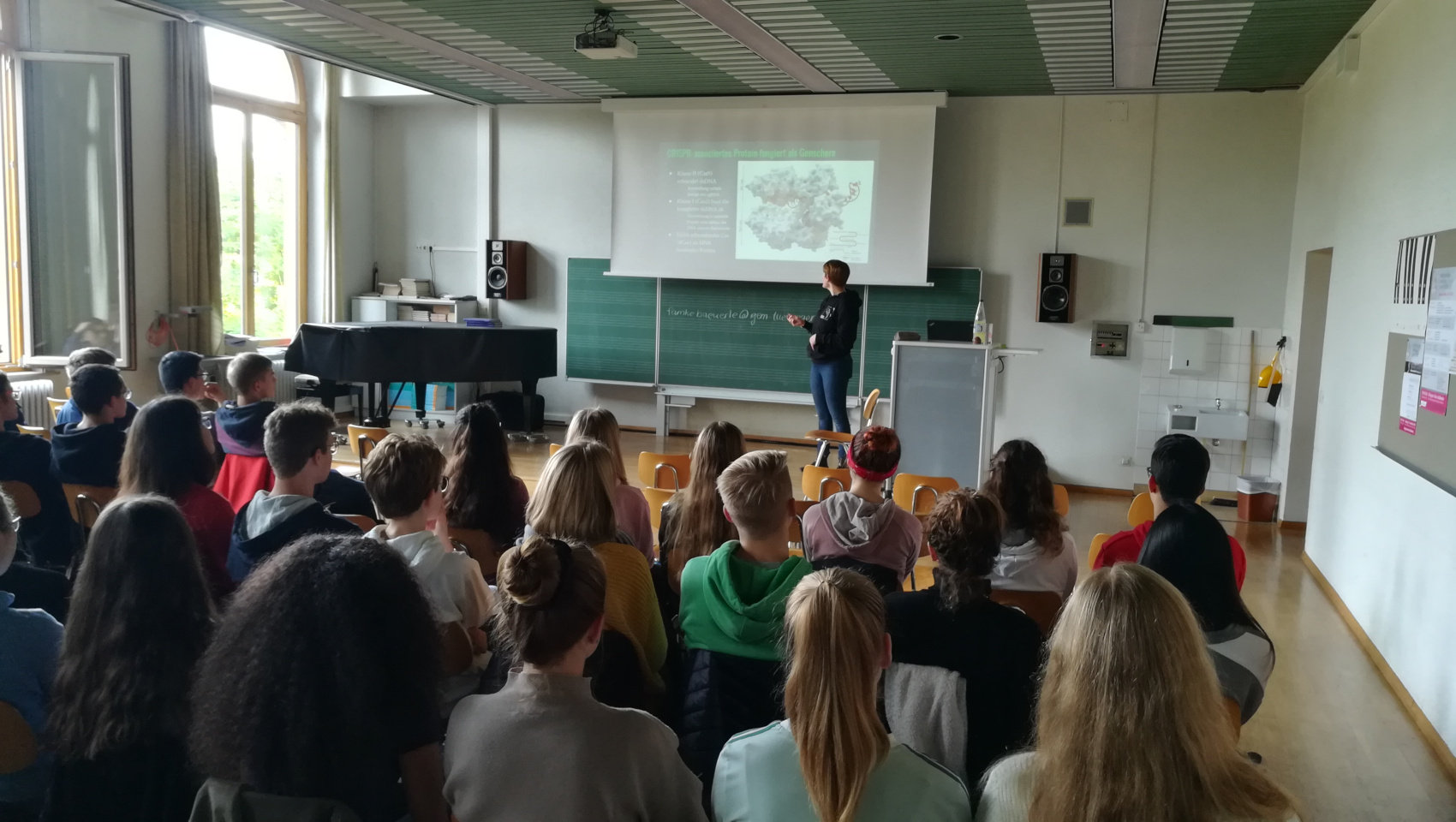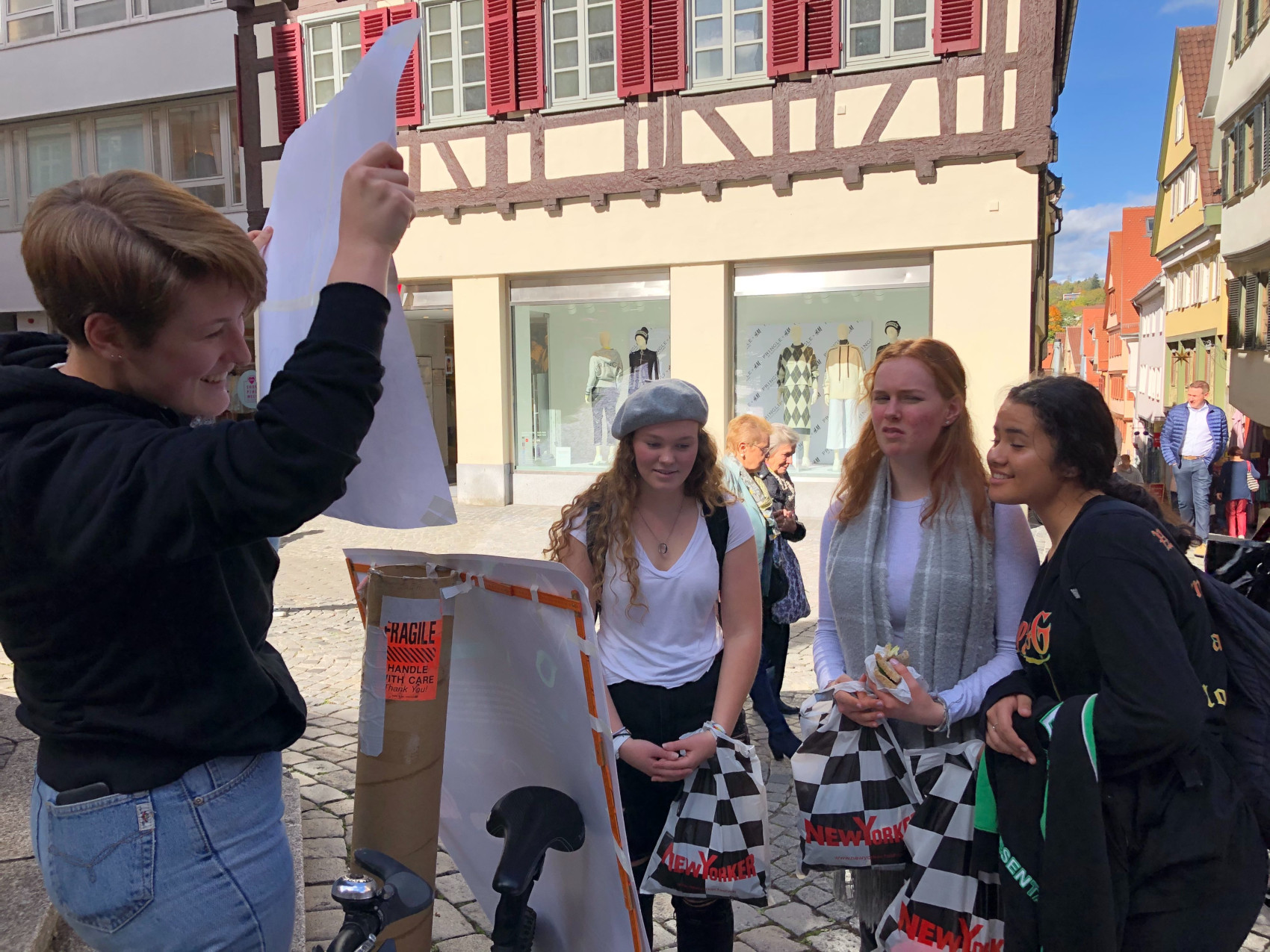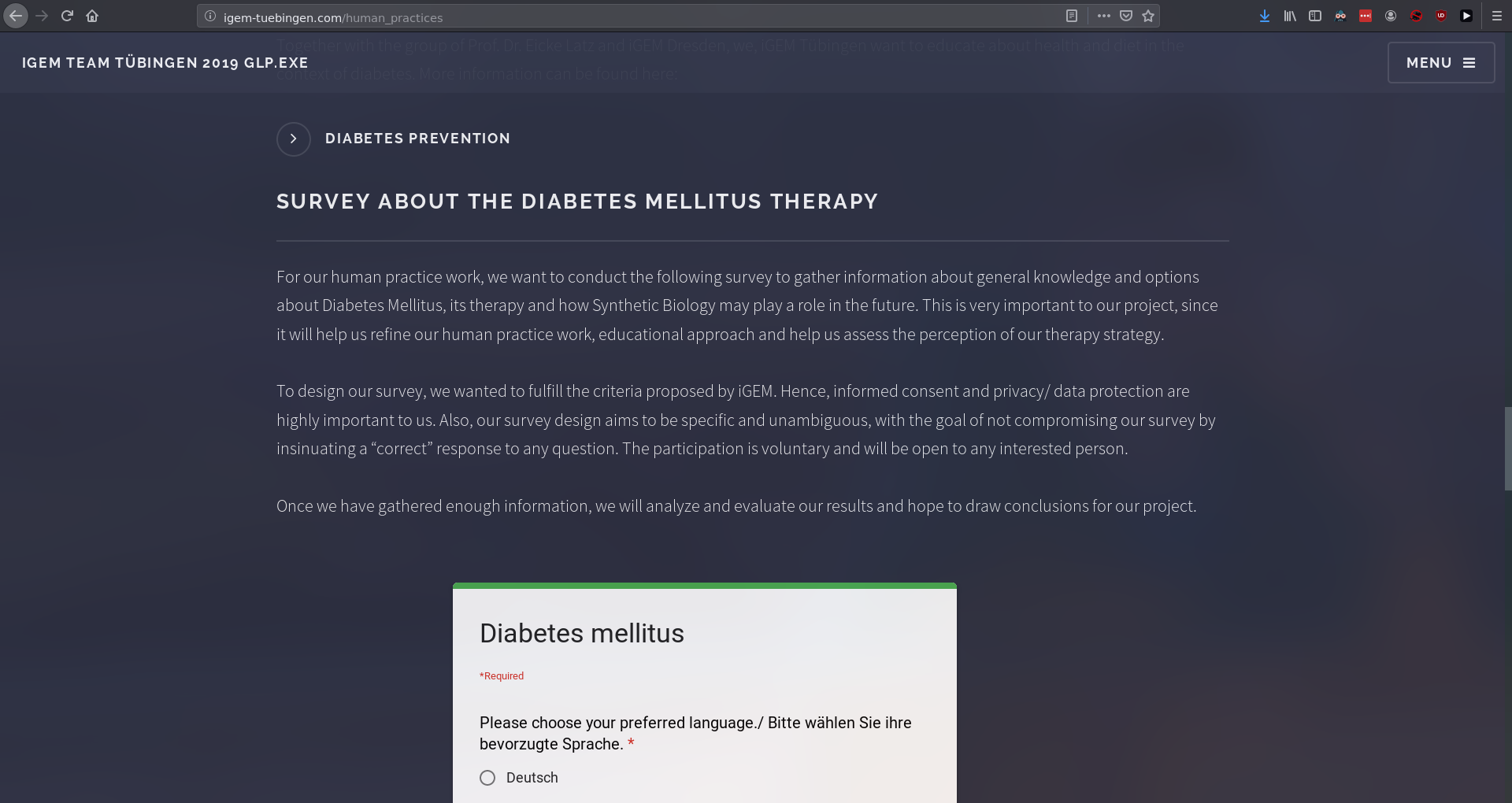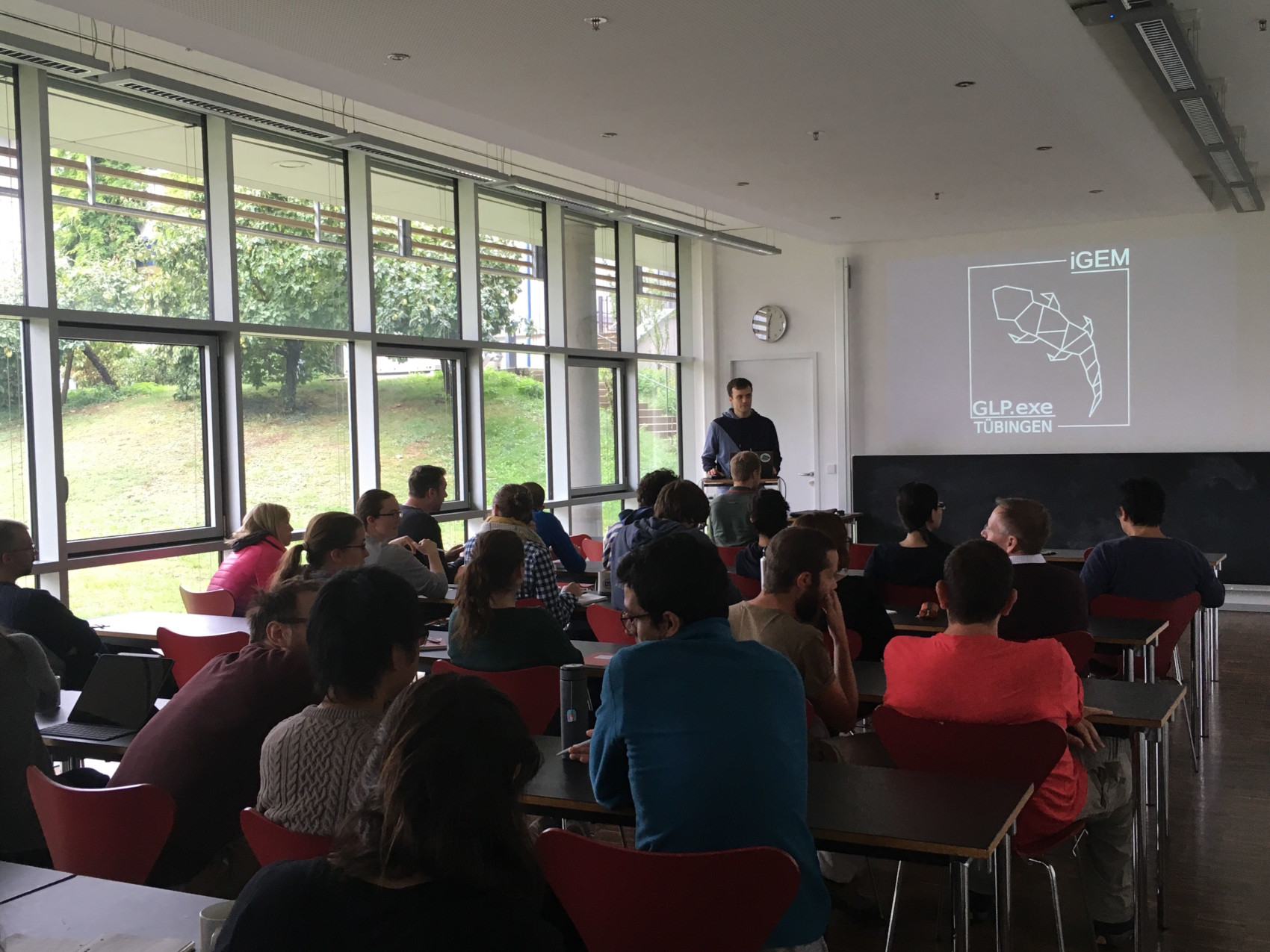Experimenta & Schools
Introducing young, aspiring students to the natural sciences is imperative towards preparing them for scientific careers. Only then will our societies be able to tackle the current and future pressing issues and developments. While there are numerous initiatives and possibilities, our team strongly believes that early education is key to preparing students for a society susceptible to new techniques and advancements.
Collaboration with Experimenta Science Center
The Experimenta Science Center [1] in Heilbronn, Baden-Wuerttemberg, Germany set up the “Schülerforschungszentrum” (SFZ) last year where young researchers are actively supported in their initial scientific work. This inspired us to reach out to them and offer our expertise and lab literacy.
Together with Dr. Robert Friedrich we designed and executed a 4 day lab course and took part in a panel discussion covering CRISPR/Cas and Biohacking. Read more about our collaboration with the Experimenta Science Center on Human Practices / Experimenta Science Center.
Presentations and lectures in high schools
We believe that education in the field of Synthetic Biology is key in order to promote it in the society and get rid of the stigma of the “bad” GMOs, especially in Europe and more specifically Germany, where GMOs are largely banned. Our team members visited their former high schools and taught the students about synthetic biology, the iGEM competition and our project. Our presentations sparked great interest in the schools, but also the students and several of them are investigating the possibility of starting a high school team in the coming years.
Please refer to Parts / Downloads to obtain our educational material.
Public Outreach
Introducing synthetic biology to a society where people are afraid of GMO crops and rather buy ‘gentechnikfreie Lebensmittel’ (non-GMO food) is a big challenge. However we strongly believe that thoughtful education is key to a society susceptible to new techniques and advancements. We wanted to reach out at as many different events and places possible, to reach the most people possible and spread our love for GMOs.
Booth at the city center in Tuebingen
In our effort to generate more public awareness of the possibilities of GMOs we implemented an informational booth at the city center in Tuebingen. During our booth event we experienced, what we already suspected before. GMOs are still largely unknown to many and a lot of prejudices towards them exist even today. This event also influenced us to take even more steps toward a more educated society with the ultimate goal of opening our society toward GMOs.
Presenting iGEM at a Science Slam
During the Biomedical symposium in Tübingen, organised by Molecular Medicine students, we got the chance to present our project as well as iGEM and synthetic biology to an audience of over 500 people at the science slam.
We informed students of the biomedical area as well as professors and researchers in the medical field about synthetic biology, GMOs, our iGEM project and promoted our survey on Diabetes and GMOs. To learn more about the survey please visit Human Practices / Survey.
Launching our own website
Our relentless passion was poured into the creation of our brand new website, which we developed from scratch. Not only did the website enable us to inform potential sponsors about our project, it also gave us the ability to host our survey, create educational content, announce the team members and introduce iGEM to the general public in a professional and accessible manner. Check out our official website under igem-tuebingen.com.
Promoting the SDGs
The Sustainable Development Goals (SDGs) of the United Nations (UN) aim at improving our society and planet by promoting prosperity, equality, peace and care for the environment. We decided to spread the importance of the UN SDGs among the iGEM community together with iGEM Tas Taipei and iGEM Costa Rica (People / Collaborations).
To learn more about our educational efforts toward the SDGs please visit Human Practices / Sustainable Development Goals.
iGEM Tuebingen featured in Biospektrum
Biospektrum is the public magazine of the Gesellschaft für Biochemie und Molekularbiologie (GBM), the Vereinigung für Allgemeine und Angewandte Mikrobiologie (VAAM), the Gesellschaft für Genetik (GfG) and the Deutschen Gesellschaft für Experimentelle und Klinische Pharmakologie und Toxikologie (DGPT). Every two months, a new issue is released to more than 15000 readers informing them about new developments in synthetic biology. Biospektrum contacted us to write an article about our iGEM project which will be included in the next issue. We ensured that our project is understandable to a broad audience.
Participation in a relay race
We had an amazing time participating in the 31st Tübinger 100km relay race on the 06/29/2019. Even though it was 32 degrees hot, we survived and reached the finish line in 4 hours and 4 minutes. While other team members were running our team member Famke Baeuerle took the chance of getting a shoutout for our iGEM Team to the large audience. She talked to the host about synthetic biology (‘Lego with DNA’) and organizing an interdisciplinary team of students. The conversation was audible to the whole stadium.
Winning Sponsors and Supporters
During our iGEM Season we were faced with the obstacle of financing our research. We made this our strength and contacted more than 200 companies and foundations. Although, not all of them were able to sponsor us, we were able to introduce iGEM to a couple of new companies that will hopefully be stable sponsors of the iGEM Team Tuebingen in the coming years. This year we could win over 30 partners (People / Sponsors) to support our iGEM team, proving that our work is significant and conducted in a professional manner. We are especially happy that our partners and sponsors expressed great interest in our work and asked for regular updates.
On top of that we aimed to improve our standing as iGEM Team at the University of Tuebingen. Hence, we held multiple talks and presentations in research groups and different departments. Check out the slides we used below and also refer to Human Practices / Experts for further insight on how we incorporated feedback from our supporters.
Diabetes prevention
In 2014, there were 422 Million adults with diagnosed Diabetes Mellitus worldwide[2]. Overall, there is more than enough evidence that western life-style, in its sedentary, high-sugar, high-unsaturated fatty acids, high-cholesterol, high-salt and low-fibre way, promotes the development of inflammatory and chronic diseases [3, 4]. Although, especially in research environment, this fact is known, knowledge transfer to the public has not been sufficient enough to adequately spread the notion of a balanced nutrition to prevent potentially fatal diseases, such as Diabetes Mellitus and Morbus Crohn [3, 4, 5, 6].
Gaining expertise in clinical Diabetes treatment
Claudia Leippert is a certified Diabetes Specialist Nurse (DSN, B.Sc.) with more than 30 years of experience in the treatment of Diabetes. We talked to her about what type 2 Diabetes is, how it develops and how it differs from type 1 Diabetes and how Diabetes illnesses develop on a global scale. She gave us very valuable insight into how type 2 Diabetes is normally being treated and introduced us to clinical challenges from her day to day work.
All the information she provided is also summarized in a short interview in the video below.
Our main takeaway was that every treatment has to fit the patient and that no patient will consistently follow instructions he or she does not agree with. Another main point is that treatments must become globally available and affordable. This led us to think more about the money side of our therapeutic (Project / Entrepreneurship) and include estimates on how expensive our probiotic would be.
Conducting a Survey
We conducted a survey to gather information about general knowledge and options about Diabetes Mellitus, its therapy and how synthetic biology may play a role in the future. To design the survey, we aimed to fulfill the criteria proposed by iGEM. Hence, informed consent and privacy / data protection are highly important to us. Also, our survey design aims to be specific and unambiguous, with the goal of not compromising our survey by insinuating a “correct” response to any question. The participation was voluntary and open to any interested person. To learn more about the survey please visit Human Practices / Survey.
Establishing educational material about Diabetes Type 2 prevention
Together with the group of Prof. Eicke Latz of the Institute of Innate Immunity in Bonn and iGEM Dresden (People / Collaborations), we established educational material about possibilities that individuals have in order to prevent diseases like Type 2 Diabetes and adipositas. As we, iGEM Tübingen, target Type 2 Diabetes treatment and iGEM Dresden works on the development of a new sugar substitution, we want to share our knowledge with the public and start a preventive project.
We combined education about healthy nutrition, which prevents diseases like Diabetes from occurring solely because of malnutrition, and the usage of GMO-based food. We are aware, that especially in communities like the vegan and organic community, who are trying to base their diets on health-based concepts, GMO-based food, which means food that is either a GMO, contains a GMO or was produced by a GMO, is faced with a lot of, in our opinion unreasonable, stigma. This is especially important, since due to the rising world population, at one point there won’t be enough resources, if we completely rule out the use of GMO-based food.
Overall, we wanted this project to be a plea for healthy, GMO-based food. Please refer to Parts / Downloads to obtain our educational material.
References
- Website of the Experimenta Science Center (https://www.experimenta.science/).
- World Health Organization. (2016). Global Report on Diabetes. Online available [Accessed 26.03.2019].
- Christ, A., Lauterbauch, M., Latz, E. Western lifestyle and the immune system, an inflammatory connection, not published.
- Mozaffarian, D. (2016). Dietary and Policy Priorities for Cardiovascular Disease, Diabetes, and Obesity: A Comprehensive Review. Circulation 133, 187-225.
- Atkinson, F.S., Foster-Powell, K., and Brand-Miller, J.C. (2008). International tables of glycemic index and glycemic load values: 2008. Diabetes Care 31, 2281-2283.
- Hosseini, Z., Whiting, S.J., and Vatanparast, H. (2016). Current evidence on the association of the metabolic syndrome and dietary patterns in a global perspective. Nutr Res Rev 29, 152-162.
- Visit icons8.com for the beautiful icons we used.









































